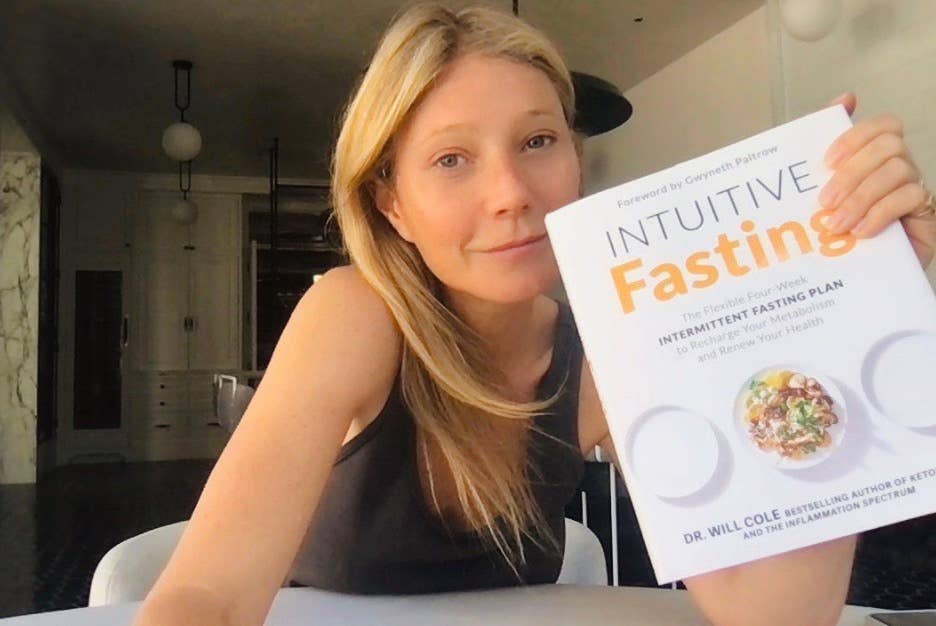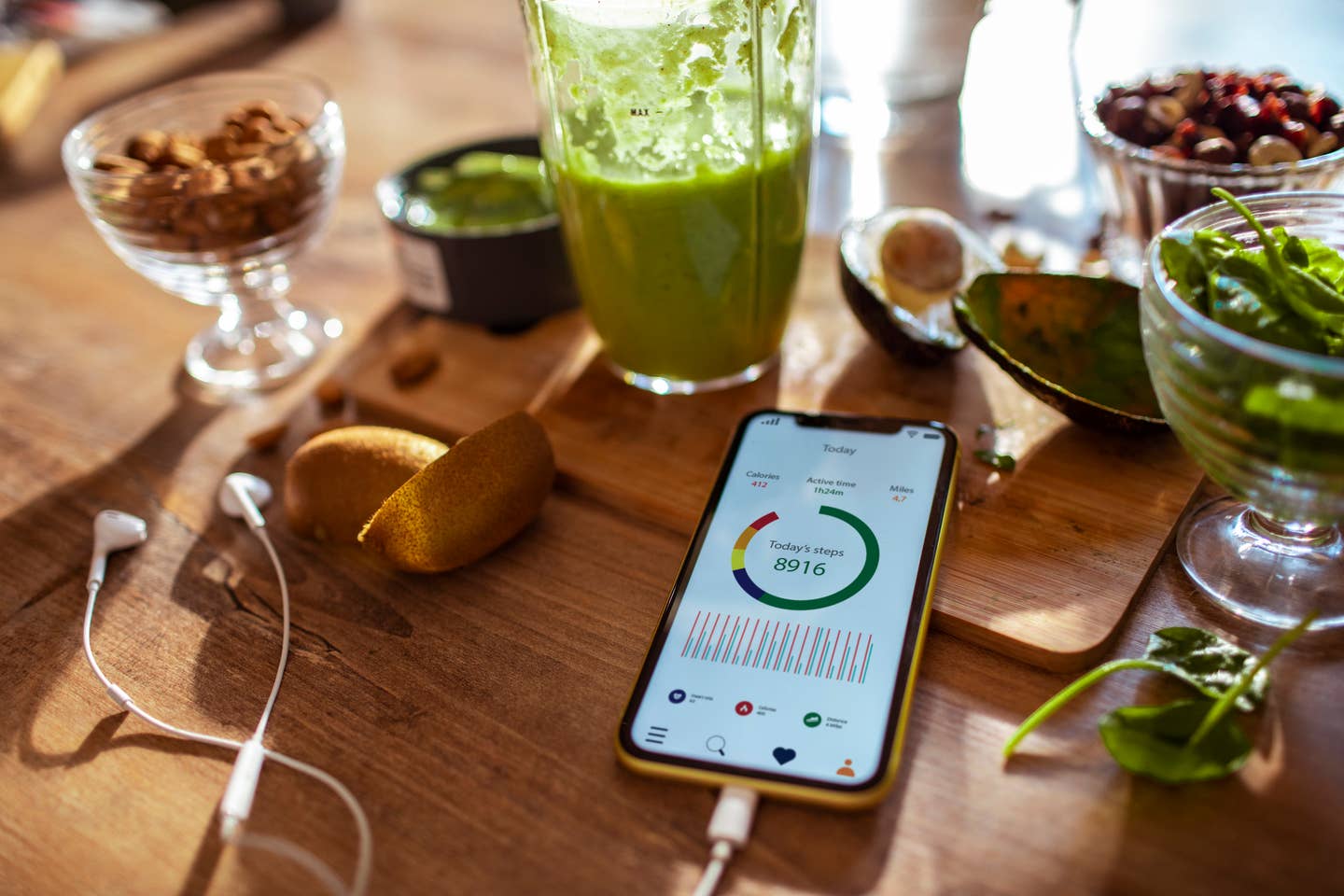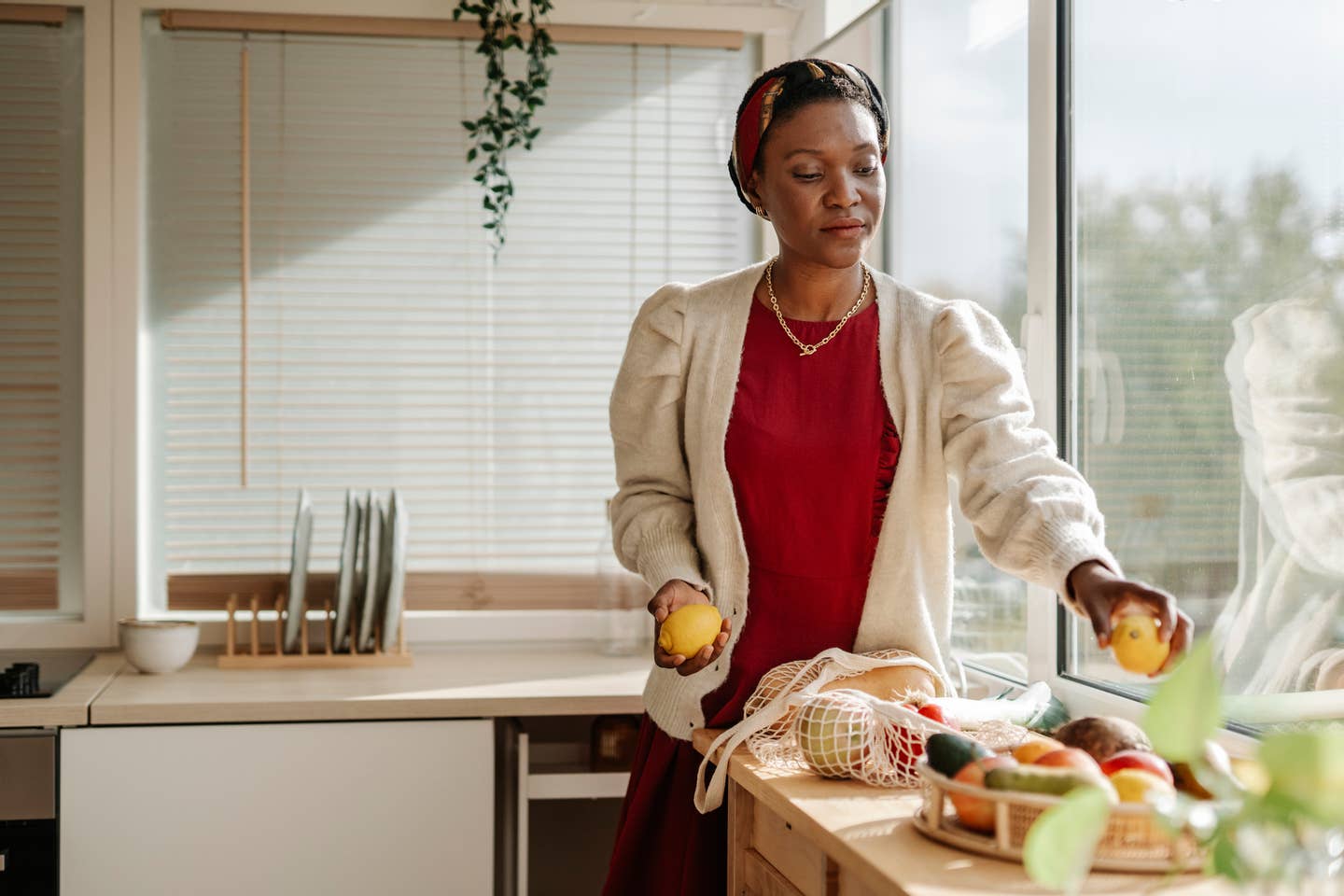
How to Use Gwyneth Paltrow’s Approach to Losing Weight Without Dieting
Dr. Will Cole is a functional medicine practitioner best known for helping guide Gwyneth Paltrow in her quest to be her healthiest and stay slim by learning to take an intuitive approach to eat when hungry and skip food when not. Now, the student has become such a master that Paltrow has teamed up with Cole to write the introduction to his new book, Intuitive Fasting: The Flexible Four-Week Intermittent Fasting Plan to Recharge Your Metabolism and Renew Your Health. We caught up with Cole and asked him how this basic idea worked, and how to use it.
Cole's approach is to tap into the body's natural hunger cues and create a flexible metabolism that he says you can train the way you do your body for a yoga class. By teaching your metabolism to bend and flex and never break, you will use a combination of intuitive eating and intermittent fasting to hit reset on all your body's habits.
The idea is so attractive because it does not adhere to diet rules, nor require calorie restriction nor counting of macros. In fact, the only stipulation is that you fast at first, to hit reset, and then from there you are off to the races. If you have found fasting impossible, this time may be the first time it will work for you since Cole will say you just need to practice. (Of course, always check with your doctor and discuss any new diet, especially if you are on medications.)
“Intuitive Fasting is Will’s clear four-week program designed to set you up to feel your best for all the other weeks to come," Paltrow writes in the forward. "This is not a book of dogma. It will not punish or restrict you. If there is something difficult in this book it is Will's request that you listen to yourself, your own body, your intuition. While this might seem simple, it is usually not easy, at least not at first." She goes on to write that when you get it right, it becomes not just doable but "exhilarating." Paltrow adds that others tell you to eat intuitively, but Cole shares exactly how to do it, in a health-oriented method: "It’s full of what he’s learned about reducing inflammation, restoring balance, recharging metabolism, and resetting gut health."
Intuitive Fasting is a health-oriented program, not just a weight-loss strategy, Cole says
When asked if the bigger goal was to get healthy or lose weight, Cole says, "Get healthy." and points out that this fasting method will help with inflammatory problems or gut issues, or any other possible impediment to feeling healthy and losing weight. "I say in the book, you have to get healthy to lose weight," says Cole. "It's not about trying to lose weight to get healthy. Weight loss will be a natural byproduct of getting healthy." He wants to help people make peace with food and figure out how to be their healthiest, now and in the long run.
The onramp is simple at first: Eat for 12 hours and fast for 12 hours, then the difficulty level gets a little steeper (16 hours of fasting) during week two, and finally the third week you are practicing some days with a larger window of fasting. Then you go back to 12 hours on, 12 off (for some people that might mean not eating between 9 pm and 9 am, which is completely doable). Your only job is to listen to your body during the eating windows and not chow down for no good reason, and understand what is "true hunger," as opposed to the usual bad habits of eating when bored, to soothe emotions, or ripping open the bag of potato chips just because it's there.
We spoke to Dr. Cole, who is a Doctor of Natural Medicine (and a Doctor of Chiropractic) in this exclusive interview about how to apply this way of intuitive eating to a mostly plant-based diet to get healthier with every bite–or to lose weight if that's your goal.
Think of intuitive eating as yoga, for your metabolism, since you learn to be flexible
Cole and Paltrow's approach "melds the seemingly paradoxical worlds of intuitive eating and intermittent fasting" to give you a way of losing weight without ever feeling as if you're dieting. Throughout the "Flexible Fasting Plan" in the book, Cole offers suggestions about eating and fasting windows that return us to our happy childhood state of "if you’re hungry, you eat. If you’re not, you don’t!" Cole talks about being flexible and creating a flexible metabolism. This yoga-like flexibility is naturally occurring in our bodies, he says, and when we listen to our most genuine intuition, instead of blindly following the norms of three meals a day or eating to be social, we can drop pounds naturally.
What is so attractive about intuitive eating and intermittent fasting (which is the nomenclature for simply not eating for a window of time and allowing your body to burn fat and energy already stored in your cells), is that it's a way of losing weight while loving your body, and taking care of and healing the body you love. The book, Intuitive Fasting, helps you reset your hunger cues and lose weight in four weeks. The idea is to "find metabolic flexibility" Cole explains, "and once you've reached metabolic flexibility, you can intuitively trust your body to function at optimal capacity, whether you've eaten six minutes ago or six hours ago," he adds.
"When it's done right in a sustainable and healthy way, intuitive fasting can move the needle on someone who is stuck or on a plateau," Cole says, so they can get and stay healthy. Paltrow herself has told fans in recent weeks about the lingering effects of COVID-19 on her mental and physical health, and she told her followers on the Goop blog post that she battled coronavirus "early on" and it has left her with "some long-tail fatigue and brain fog."But being intuitive about your food intake and your fasting help your body fight off infection, heal, and bounce back from symptoms of any virus, she explains. She says she has been feeling better by eating a diet that is mostly keto and plant-based "but flexible" and she has cut out sugar and alcohol. (This intuitive approach works whether you are plant-based or not).
Here is Dr. Will Cole's exclusive interview with The Beet, where he explains exactly what is entailed in Intuitive Fasting, learning to find what he calls "food peace," and using fasting to figure out exactly what works best for you.
The Beet: What made you want to write this book? And why do you believe in this way of eating as a healthy weight loss strategy?
Dr. Cole: I started one of the first functional medicine telehealth practices, and we would see patients for over 10 hours a day 50 hours a week and I loved helping them and watching people’s lab results and getting the labs to improve, we saw their health and their lives improve. So that experience is born out of my clinical experience, by using a flexible, mindful way. And seeing how to use a flexible mindset and a flexible approach is a powerful tool no matter how they eat!
Flexible intermittent fasting is free, accessible and when it's done right, it can be a powerful tool. It can help those who have not been successful in the past, move the needle for anyone who is stuck on a plateau. The phrase that comes to mind is from Paracelsus, one of the fathers of modern medicine, a Swiss doctor in the early 1500s who introduced toxicology and the natural elements to healing. He called fasting the physician within. If you have this "inner doctor" it means fasting helps regulate and support, repair, and reset and recalibrate.
That is where intuitive fasting came about. Paracelsus is known as the Martin Luther of medicine If you work with the doctor within it means you are fasting and combining it with intuitive eating, which is melding these two worlds. On the one hand, you have this alpha concept of intermittent fasting, which often tells people that more is better, and they use it as a biohacker approach, and then you have this intuitive approach. The way I see it is: You should come to fasting with grace and light and mindfulness and use fasting and food as a mindfulness tool.
The Beet: So how do you get started, if you're someone who wants to try this out?
Dr. Cole: I start off and have a protocol in the book, which on the surface may seem paradoxical. But the goal of the protocol is to learn about your body. It's just like yoga. If someone is metabolically inflexible or rigid they have blood sugar issues, they have insatiable cravings, they are hangry, or they are fatigued. They are dealing with chronic inflammation or digestive problems. That crowds out intuition. Is it intuition or cravings? Is it intuition or feeling hangry?
Blood sugar imbalances do not lead to intuitive eating, but a lot of times you are going to be drawn to the foods that will perpetuate the fact that you are not feeling well. That is not intuitive at all So I really want to calm the noise in the body and work on your metabolic flexibility and once you get proper blood sugar balance, that is laying the groundwork for intuitive eating and mindfulness.
Because if you don't feel well and you are eating all the wrong foods, it's hard to know if you are eating intuitively or not.
Intuitive fasting is a way of melding these two worlds, where you have intermittent fasting, where it can come with the idea that more is better, as a bio-hacker approach, and what we are talking about is this intuitive way where you should come to it with grace and lightness and mindfulness, and you should come to it with the ebb and flow and it is so intuitive. The point is to help your body become more flexible because more is not always better. This ebb and flow of these vacillating windows of eating and not eating that people find is a more sustainable way of eating and more natural.
The Beet: So you hit reset, and then how do you get to the point where it's intuitive?
Dr. Cole: Getting to the point where you have authentic satiety cues and hunger cues is the goal since that is fertile ground for figuring out when to eat. When someone goes to yoga at first they are tight or have tight hamstrings and they think yoga is not for me, but you have to learn to become more flexible. That's the point of this fasting protocol.
We start off week one with a big 12/12 eating window, so you have a 12-hour eating window and a 12-hour fasting window, and you basically are not eating too late at night and you are not eating through the night, essentially.
Week two is a 16-hour fasting window, and week three is deeper, It's a few nonconsecutive almost OMAD fasts. it's almost OMAD (One Meal a Day) because it's more flexible than that. You are getting all the foods that you need but in a specific window.
And then in week four, you're back to 12 and 12. So you are never doing the same thing for long. So it's like in yoga when you hold that warrior two poses, but it's not for long. You are never doing the same thing for long, so it's like that yoga pose, but you aren't holding it for long.
The Beet: So this is the starting plan and then you get better at listening to your body?
Will Cole: Yes, You begin to be able to hear that small voice of your intuition Over time you can grow that window and you get to eat all your food within that window. Just like a yoga pose that feels hard, you aren't holding it for long. Over time you are going to know your body, and think: I am going to do more of this or more of that. I want people to get used to listening to their bodies and learn what works for them.
The goal of this is just like that yoga class. You can get rooted in your body and you're going to grow the awareness of your body and everyone is different. The point is to allow yourself to think about what works for you. And then you get to decide: I'm going to do more of that. Just like in yoga, you can do more of that pose, and as you get better at it you evolve your practice.
The Beet: So how do you know when you're hangry or when to fast and when to eat?
Will Cole: It's constantly checking with your energy levels, checking in with your mood and your sleep. It's an art form and the more you show up you can cultivate what you need. You may think that tomorrow you're doing an 18 hour fast but you wake up and think nope, I am going to have breakfast. it's about showing up for yourself and I want people to grow with their awareness and after four weeks you may not be fully aware yet so by doing it over and over, they are going to grow their awareness over time.
Most of the recipes are vegan. It's like "ketotarian." That book is mostly vegan keto but some of it is vegetarian. It's still planted forward and plant-centric. The recipes in this book are mostly 'ketotarian,' and in that sense, it's like a sequel to my book Ketotarian®: The (Mostly) Plant-Based Plan to Burn Fat, Boost Your Energy, Crush Your Cravings and Calm Inflammation.
In Intuitive Fasting, there are over 65 recipes and most of them are vegan. There are also carb-up days and all those are vegan keto too. So there are plenty of options, if someone wants to substitute out their protein with tempeh or some sort of plant-based protein, that's fine too. We provide a way to do this that is flexible and gives plant-based options that work with your metabolism,
As you get more blood sugar stability as you get proper you'll modulate leptin levels will start to come down, as you get less insulin resistance, your gut health improves--all these things are infrastructurally what somebody to have more agency over their appetite and feel more control, not in an obsessive way but in a measured way. They think: I can go longer, I am not hungry, I am still satiated because everything in the body is a little more sound. Not because you are depriving yourself but because you will just be full longer.
That is what is metabolic flexibility, and allows you to naturally ebb and flow from this space
The Beet: A lot of people fast and I have cocktails and nachos and whatever I want.
Will Cole: That is why we give them over 65 recipes in the book. You want to have stability, and even when you do eat you want to have normal fluctuations, not a volatile blood sugar roller coaster. So blood sugar is normal but you want a ripple of a current and not a massive tidal wave. You don't want to fast your way out of a poor diet. You can't fast and binge. That isn't healthy. You need to think of fasting as medicine and food as medicine. That is where the magic happens.
That is why I paired these fasting windows with "ketotarian" recipes. Intermittent fasting and 'ketotarian" work together because it is a fasting-mimicking diet that is higher fat and lower-carbohydrate, and you see a lot of studies and they both support autophagy in their own way. One of the ways is that its moderating protein and the pathways that are associated with autophagy and longevity and stem cell support and immunity. But typically a longer time in ketosis is when autophagy sets in.
The Beet: Is your book focused on a goal a weight loss goal or a health goal?
Will Cole: It's a health goal. So I go back to Paracelsus's words there: The physician within. If someone is struggling with weight loss resistance, whether that be driven by insulin resistance, leptin resistance, inflammatory problems, or gut issues, or whatever the impediment is that is holding them back from being a fat burner, we are going to repair that and support that and overcome that.
But there are many people that weight loss is not the goal. For most of my patients that is actually the case. It may be third or fourth on their list. They just want to be healthy. They want to overcome the fatigue, they want to lower their inflammation levels. They want to support their gut health, increase energy and brain function. So that's the main goal of the book.
I say in the book, you have to get healthy to lose weight. Not trying to lose weight to get healthy. It will be a natural byproduct of getting healthy, but it is not the main goal with this diet that is meant to be a fad crash weight loss thing. Your tapping into the physician within and your body will find its set point as you heal.
The Beet: So is there something people who want to eat intuitively should know?
Will Cole: There is no magic window so if something works for you, keep doing it, that's where the needle mover happens because you will keep doing it. But if you don't like what you're doing try a new window. Some people do great with breakfast in the morning and end eating earlier in the day since they don't need to eat dinner, whereas other people are the opposite: they prefer eating dinner and don't need to eat early in the day. They are not a breakfast person. So you have to look at what works for you. Whatever works for you is the approach. It's about going toward the things that make you feel great.
The Beet: We would be better off eating when hungry and not eating when not.
Will Cole: That is why I use fasting as a therapeutic approach. You have to start using food as medicine and fasting as medicine. it's the therapeutic phase. it's about going toward the things that make you feel great. You love feeling better more than what made you feel lousy.
I say: You can't heal a body you hate. You can't shame your way into health or obsess your way into wellness. It probably won't be sustainable and even if it is, you will be so miserable and cortisol will get raised up and it won't be possible to be healthy. You will have an unhealthy relationship with food.
The question is 'How can you feel the best you can feel?' How can you have the energy you want to have, feel grounded in your body, and accept your body. it's when you feel great. That's what this is all about.
It's something I call in the book "food peace." It's about feeling: I'm okay and I'm not at war with you [food] and I am not making food something it is not.
The Beet: It's not easy to have a healthy relationship with food. You help solve that.
Will Cole: When you start feeling better it's so encouraging. People know intuitively they need to do something different. and they are curious enough to lean into it.
More From The Beet






